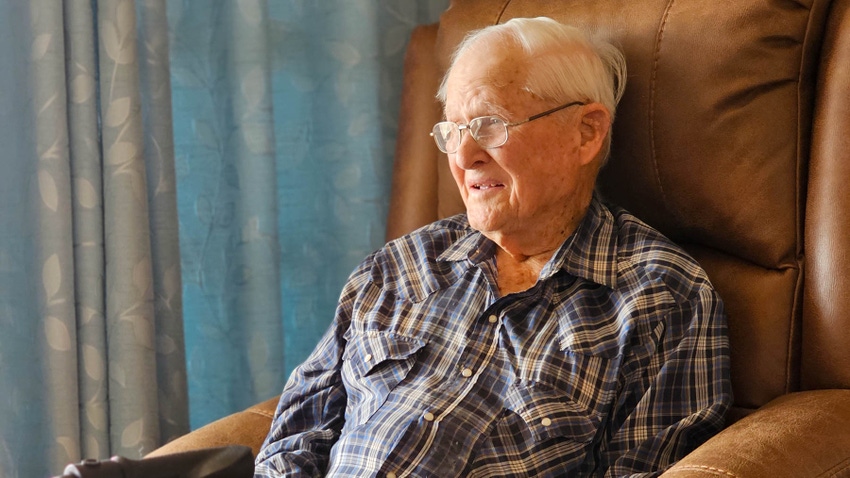
In this 3-part series, two Texas Panhandle families, who happen to be related but live in different communities, share their accounts of outrunning and surviving the Smokehouse Creek fire.
When 97-year-old Rudolph Rankin and his wife Lynda got the call it was time to evacuate their Roberts County ranch, they chose the closest and safest place — a newly planted wheat field across the highway.
“There was no grass that could burn,” Lynda said. “We went out at 10 that morning and parked there until about 8 that night.”
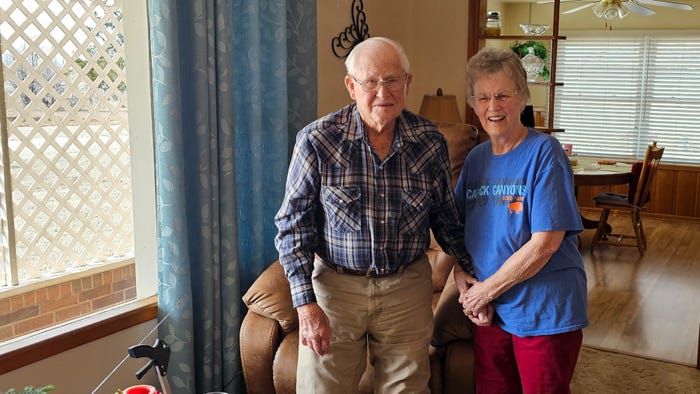
Rudolph and Lynda Rankin, Miami, Texas (Photo by Shelley E. Huguley)
The couple lives nine miles from Miami, Texas, and another mile and a quarter off the pavement. Their home is surrounded by endless acres of dry fuel from the persisting drought.
The Smokehouse Creek fire was already on the move. Rudolph had seen smoke in the distance.
The couple’s grandson, Tyler Rankin, who also lives on the ranch, encouraged his grandparents to prepare to leave. And with Rudolph’s limited mobility, they’d need ample time to load.
Lynda began to gather their belongings. “I loaded the car with some essentials, medication and water and coats. We were ready.”
Then the call came. A Miami volunteer firefighter urged the couple to get to safety. Evacuation orders had been issued for Miami but also nearby Pampa and Canadian, where they had family fleeing from the flames as well.
“We stayed for 10 hours just sitting in that wheat field,” Lynda said. “We had four or five more neighbors in their cars that joined us.”
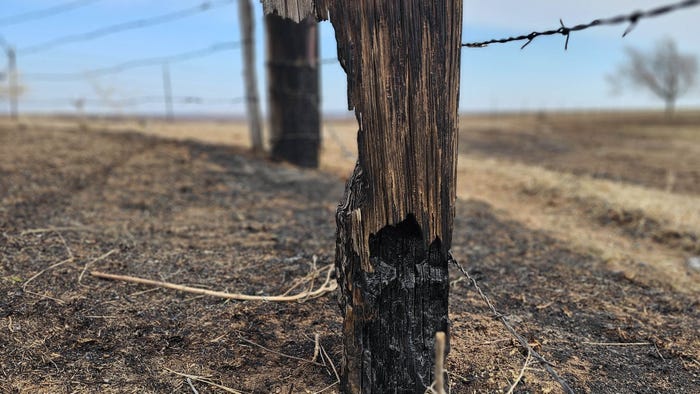
Burned fence posts near their home. (Photo by Shelley E. Huguley)
Smoke billowed across the wheat field. A neighbor who had joined the caravan parked about 12 feet from the Rankins. “At the height of obscurity, I couldn’t even see the outline of her pickup because of the smoke,” Rudolph said.
“I can’t tell you how horrifying it was,” Lynda said. “I'd cry and then I'd pray and then I'd cry some more.
“It was like a bad dream.”
At one point, the fire threatened the wheat field. “The flames were so high at that fence that we had to back up,” Lynda said. “It was so hot.
“I lost it. I cried and we prayed, and we just watched it. That's all we could do. We couldn't get out on the road. It was on all four sides. We couldn't go to Miami. We couldn't go to Pampa. The highways were closed. We couldn't go to Canadian. They were not letting anyone in or out, so we just lived right there for 10 hours.”
"The reason we was in that field over there, it was a safe place," Rudoph said. "And I wanted to be to where I could get to this place immediately because the last fire we had, I had a trailer sitting right out there across the road. We came back to the house as quick as we could and put a fire out on that trailer and kind of saved the trailer. Also, there was some burning going on around here. That's the reason we were in that wheat field to start with, so it'd be close by."
In the meantime, their grandson had rounded up the cattle and moved them to safety. “I was so concerned about Tyler because through all the smoke, he turned on the sprinkler here and the one at his house and checked on the cows. I guess he penned some down at his place. I don’t remember but these corrals [at our house] were full of cattle and one horse,” she said.
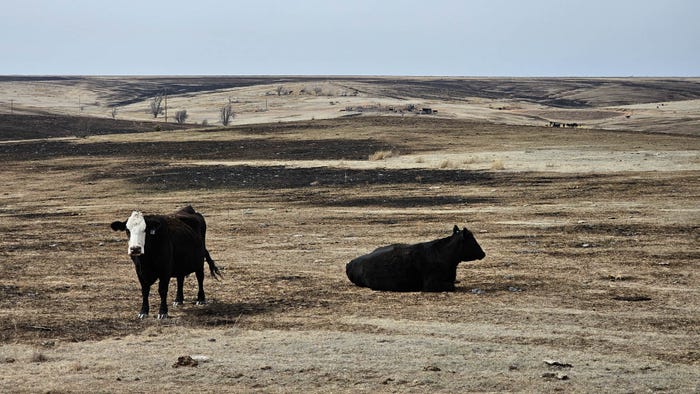
Blackened rangeland surrounds Rudolph and Lynda Rankin's home.. (Photo by Shelley E. Huguley)
As they waited out the fire, Rudolph told Lynda, “We gotta go home,” to which she would reply, “No. I don't want to go home. I didn't think we'd have anything left.”
About 8 p.m., the Rankins left the field and began the short drive home. “When we got on the highway, there were flames on both sides,” Lynda recalled. "I had to drive through those flames to get to our road.”
“It was a narrow deal,” Rudolph said. “Well, it was flames. They were red hot. Not for far,” Lynda countered. "I tell you, God took care of us that night and a lot of other people.”
The couple’s home, along with Tyler’s, survived. By the time the Rankins arrived at the ranch it was dark. “We couldn’t see all the black,” Lynda said.
Thankfully, their home was unscathed, although there was evidence the flames got close, Rudolph added. Some calves were lost, but no human lives or homes.
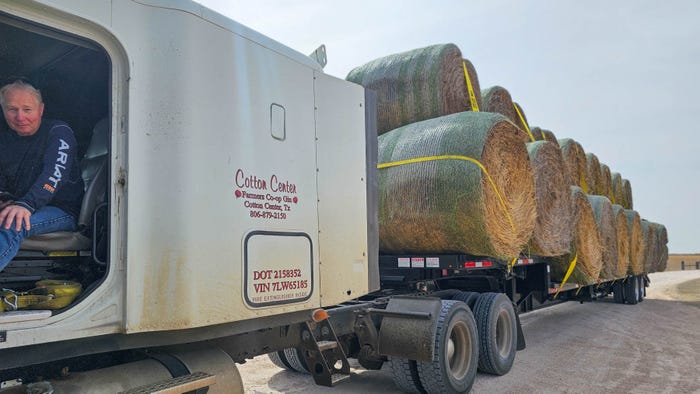
Special delivery: Donated hay bales from Cotton Center, Texas, arrive at the Miami ranch. (Photo by Shelley E. Huguley)
2006 fire
Rudolph’s lived on the ranch since 1963. He’s survived wildfires before. He compared the Smokehouse Creek fire to the one that raced across the ranch in 2006.
“This is the second burnout we've had,” he recalled. “It [2006] was a little bit different than this one because it came through here with 60 mph winds. The firemen, or different ones who have the opinion, or the truth, that however high the wind is, add 20 mph in order to keep up with it. That one in 2006, was gone and I mean gone. It burned all the fences, the ones from the 1800s with the wooden posts.
“This one [Smokehouse Creek fire] was different. We could see it coming. And the reason we were in the wheat field so early is I already knew that you can’t drive in a fire and know where you’re going. You’ll get in trouble.”
The wind driving the Smokehouse Creek fire was terrible, Rudolph said. “That's the way this fire did. It popped up and hopped from one grass to another."
Lynda said, “I’m just so thankful we got out alive.”
The Smokehouse Creek fire burned over 1 million acres, making it the largest wildfire in Texas history.
About the Author(s)
You May Also Like






